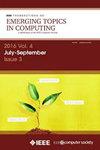量子启发的差分进化,利用哈希解码实现边缘计算环境中的高效用户分配
IF 5.4
2区 计算机科学
Q1 COMPUTER SCIENCE, INFORMATION SYSTEMS
IEEE Transactions on Emerging Topics in Computing
Pub Date : 2024-07-31
DOI:10.1109/TETC.2024.3433570
引用次数: 0
摘要
现代应用程序需要大量的计算资源来进行实时数据处理,从而允许应用程序用户(au)访问实时信息。边缘计算(Edge computing, EC)为AUs提供动态计算资源,用于实时数据处理。但是,由于资源和覆盖范围的限制,特定区域的边缘服务器(ESs)只能服务有限数量的au。因此,应用程序用户分配问题(AUAP)在EC环境中变得具有挑战性。本文提出了一种量子启发差分进化算法(QDE-UA),用于EC环境下的高效用户分配。量子矢量的设计目的是为AUAP提供一个完整的解决方案。适应度函数考虑ES的最小使用量、用户分配率(UAR)、能耗和负载均衡。进行了广泛的模拟和基于假设的统计分析(方差分析,弗里德曼检验),以显示所提出的QDE-UA的重要性。结果表明,QDE-UA优于大多数现有策略,平均UAR提高了112.42%,负载平衡提高了140.62%,而使用的ESs减少了13.98%。由于更高的UAR, QDE-UA的总能耗平均高出59.28%。然而,单位能源消耗较低是其能源效率的证据。本文章由计算机程序翻译,如有差异,请以英文原文为准。
Quantum-Inspired Differential Evolution With Decoding Using Hashing for Efficient User Allocation in Edge Computing Environment
Modern apps require high computing resources for real-time data processing, allowing app users (AUs) to access real-time information. Edge computing (EC) provides dynamic computing resources to AUs for real-time data processing. However, due to resources and coverage constraints, edge servers (ESs) in specific areas can only serve a limited number of AUs. Hence, the app user allocation problem (AUAP) becomes challenging in the EC environment. This paper proposes a quantum-inspired differential evolution algorithm (QDE-UA) for efficient user allocation in the EC environment. The quantum vector is designed to provide a complete solution to the AUAP. The fitness function considers the minimum use of ES, user allocation rate (UAR), energy consumption, and load balance. Extensive simulations and hypotheses-based statistical analyses (ANOVA, Friedman test) are performed to show the significance of the proposed QDE-UA. The results indicate that QDE-UA outperforms the majority of the existing strategies with an average UAR improvement of 112.42%, and 140.62% enhancement in load balance while utilizing 13.98% fewer ESs. Due to the higher UAR, QDE-UA shows 59.28% higher total energy consumption on average. However, the lower energy consumption per AU is evidence of its energy efficiency.
求助全文
通过发布文献求助,成功后即可免费获取论文全文。
去求助
来源期刊

IEEE Transactions on Emerging Topics in Computing
Computer Science-Computer Science (miscellaneous)
CiteScore
12.10
自引率
5.10%
发文量
113
期刊介绍:
IEEE Transactions on Emerging Topics in Computing publishes papers on emerging aspects of computer science, computing technology, and computing applications not currently covered by other IEEE Computer Society Transactions. Some examples of emerging topics in computing include: IT for Green, Synthetic and organic computing structures and systems, Advanced analytics, Social/occupational computing, Location-based/client computer systems, Morphic computer design, Electronic game systems, & Health-care IT.
 求助内容:
求助内容: 应助结果提醒方式:
应助结果提醒方式:


